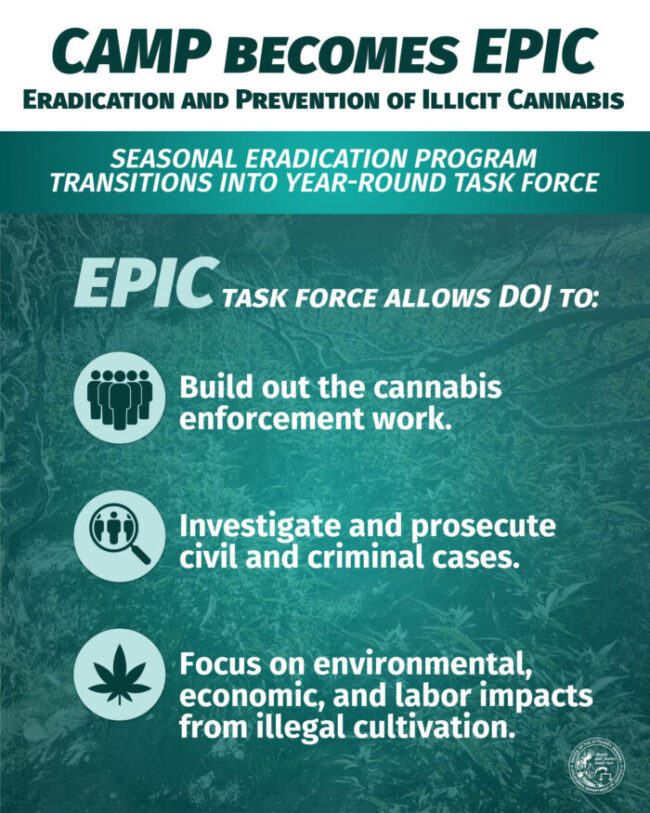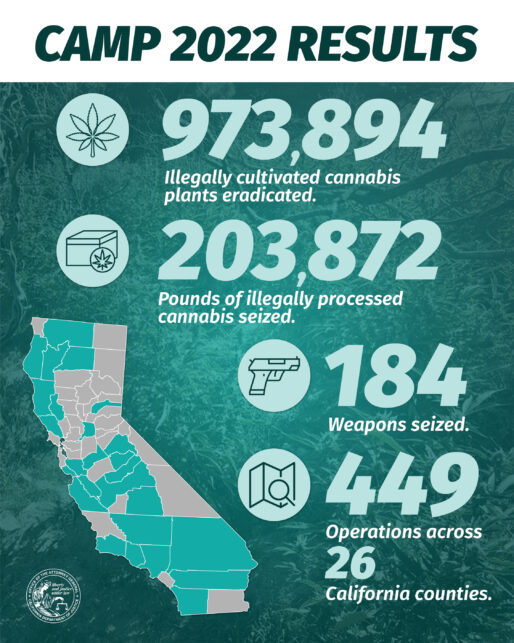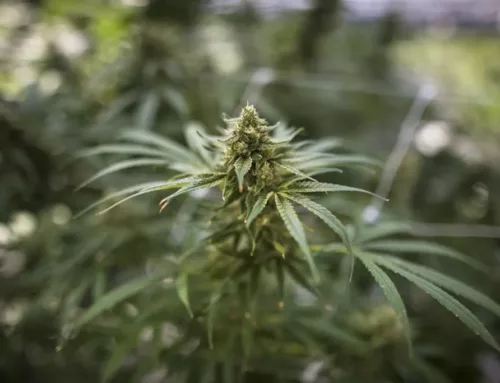California Attorney General Bonta Announces Eradication of Nearly One Million Cannabis Plants as Part of Interagency Effort to Combat Illegal Market
CALIFORNIA, Oct. 21, 2022, California Attorney General Rob Bonta today announced the eradication of nearly one million illegally cultivated cannabis plants and the seizure of more than 200,000 pounds of illegally processed cannabis as part of the California Department of Justice’s annual Campaign Against Marijuana Planting (CAMP) program. Since 1983, this 13-week program has eradicated more than 33 million illegal cannabis plants. Beginning this fall, this seasonal eradication program will transition into a year-round task force. The Eradication and Prevention of Illicit Cannabis (EPIC) task force will allow the California Department of Justice (DOJ) to build out its cannabis enforcement work and investigate and prosecute civil and criminal cases with a focus on environmental, economic, and labor impacts from illegal cultivation.
“California has the largest safe, legal, and regulated cannabis market in the world, but unfortunately illegal and unlicensed grows continue to proliferate,” said Attorney General Rob Bonta. “The California Department of Justice’s CAMP task force works tirelessly each year to eradicate illegal grows and reclaim our public lands, but shutting down these grows is no longer enough. With the transition to EPIC, we’re taking the next step and building out our efforts to address the environmental and economic harms and labor exploitation associated with this underground market. I want to thank all our local, state, and federal partners for their longstanding collaboration on CAMP and ongoing commitment to tackle this problem through the EPIC task force.”
“Collaboration is one of our best defenses in combatting illicit cannabis grows. Our continued partnership with the multiagency CAMP program aligns with our core mission to protect California’s native plants, fish and wildlife,” said David Bess, Deputy Director and Chief of the Law Enforcement Division for the California Department of Fish and Wildlife. “Additionally, removing untested and potentially harmful cannabis products from the illicit market, helps the regulated cannabis market succeed, while providing another layer of public safety.”
“Illegal cultivation of marijuana on public lands continues to be a major problem for California. These illegal operations have a devastating impact on our environment and the health and safety of communities and public land users,” said Karen Mouritsen, California State Director for the Bureau of Land Management. “The BLM is proud to be a part of CAMP’s federal, state and local law enforcement partnership and its mission to protect our public lands and maintain public safety.”
“CAMP and the cooperative efforts of our local, state, and federal law enforcement partners play a vital role in sustaining the health, diversity, and productivity of public lands,” said Dylan Ragan, Special Agent in Charge of the Bureau of Land Management’s Office of Law Enforcement and Security in California. “Working together, we bring a whole government approach to combating the damage caused by illegal marijuana cultivation on public lands. This cultivation threatens public lands by introducing dangerous pesticides, unlawfully diverting waterways, and involving drug trafficking organizations.”
“The USDA, Forest Service, Law Enforcement and Investigations (USDA, FS, LEI) has been a partner in the CAMP program for the entirety of its nearly 30-year history,” said Jeff Sadowski, Assistant Special Agent in Charge – Aviation and Special Operations, U.S. Forest Service. “The USDA, FS, LEI looks forward to a similarly exemplary relationship with the new EPIC program in continuing to pursue those who would damage our public lands through the illicit production of marijuana.”
Over the course of the 2022 season, CAMP teams operating in Northern, Central, and Southern California, conducted 449 operations, recovered 184 weapons, and removed nearly 67,000 pounds of cultivation infrastructure, including dams, water lines, and containers of toxic chemicals, such as carbofuran, methyl parathion, aluminum phosphate, zinc phosphide, and illegal fertilizers. Carbofuran, in particular, poses untold risks to public health. A lethal insecticide that is effectively banned in the United States, carbofuran remains on plants after application and seeps into soil and nearby water sources. Just a quarter teaspoon of carbofuran can kill a 600-pound lion.
In 2022, CAMP operations were conducted in the following 26 counties:
- Mendocino: 18 sites, 190,018 plants eradicated
- Riverside: 77 sites, 159,287 plants eradicated
- San Bernardino: 41 sites, 138,815 plants eradicated
- Lake: 51 sites, 97,677 plants eradicated
- Kern: 53 sites, 77,837 plants eradicated
- Siskiyou: 52 sites: 68,130 plants eradicated
- Trinity: 22 sites, 46,632 plants eradicated
- Monterey: 11 sites, 37,247 plants eradicated
- Tulare: 30 sites, 27,020 plants eradicated
- Shasta: 19 sites, 26,413 plants eradicated
- San Benito: 1 site, 24,295 plants eradicated
- Los Angeles: 20 sites, 23,492 plants eradicated
- Sacramento: 4 sites, 17,973 plants eradicated
- Fresno: 19 sites, 11,064 plants eradicated
- Madera: 14 sites, 8,757 plants eradicated
- Nevada: 2 sites, 8,279 plants eradicated
- Mariposa: 11 sites, 5,761 plants eradicated
- Ventura: 1 site, 2,370 plants eradicated
- San Diego: 2 sites, 1,510 plants eradicated
- Sonoma: 1 site, 1,407 plants eradicated
- Santa Barbara: reconnaissance only
- Santa Cruz: reconnaissance only
- Santa Clara: reconnaissance only
- Tuolumne: reconnaissance only
- Humboldt: reconnaissance only
- Stanislaus: reconnaissance only
CAMP is a multi-agency collaboration led by DOJ in partnership with the U.S. Department of Agriculture’s U.S. Forest Service; the U.S. Department of the Interior’s Bureau of Land Management and National Park Service; the California Department of Fish and Wildlife; the U.S. Department of Justice’s Drug Enforcement Administration; the California National Guard, Counter Drug Task Force; the Central Valley High Intensity Drug Trafficking Areas program; California State Parks; and other local law enforcement departments.
EPIC marks an evolution in DOJ’s cannabis enforcement work, reflecting the issues and concerns arising from CAMP operations each summer. EPIC will work in close coordination with DOJ’s Cannabis Control Section, Special Prosecutions Section, and Tax Recovery and Underground Economy (TRUE) Task Force to build investigations and prosecute civil and criminal cases.
(This information is primarily sourced from The State of California Department of Justice. Highly Capitalized has neither approved nor disapproved the contents of this news release. Read our Disclaimer here).





































